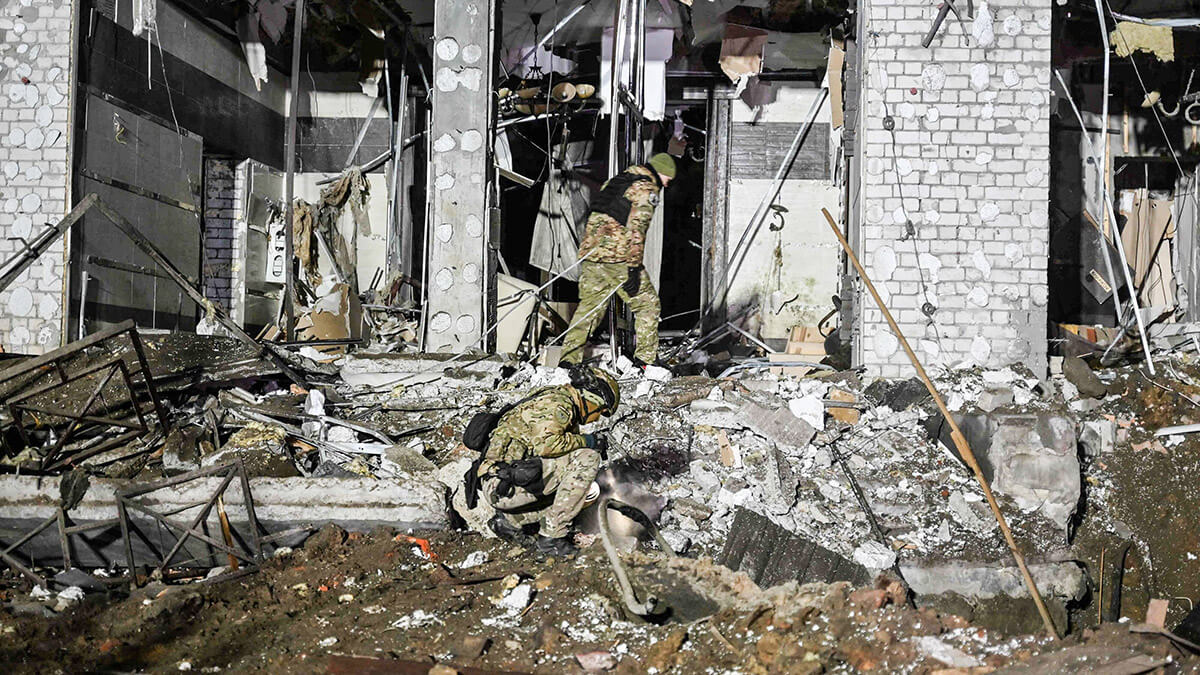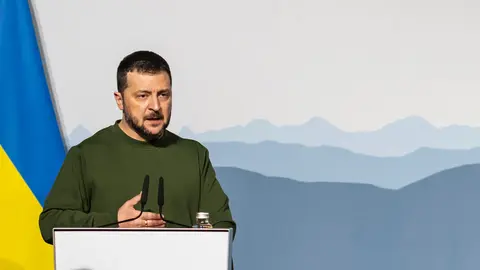Cuando se enteró de que un misil ruso había alcanzado la maternidad del hospital en el que trabajaba, la ucraniana Olena Obodets corrió enseguida hacia allí.
El ataque la semana pasada contra el hospital de Selídove, en el este de Ucrania, mató a una mujer embarazada de 36 años, y a una madre y a su hijo de 9 años.
Unos días después, Olena cuenta a la AFP, con lágrimas en los ojos, la evacuación frenética de decenas de pacientes en un hospital envuelto en llamas.
Selídove está ubicada a 30 km al este de Avdiivka, una ciudad recientemente conquistada por el ejército ruso tras meses de resistencia ucraniana.
Este revés ha avivado la angustia entre los habitantes de la región.
“Oigo a mucha gente en la ciudad preguntarse si van a evacuar o no”, explica Olena, de 42 años, mientras un acre olor a hormigón carbonizado flota en el aire, mezclándose con el ruido de la artillería a lo lejos.

“La gente tiene miedo. Mi hija me pide todos los días que nos vayamos, pero le digo que aún no es el momento”, explica.
A medida que se acercan los combates, la policía se enfrenta a la difícil tarea de evacuar a los civiles de una zona cada vez más peligrosa.
Los ataques y avances rusos han impulsado a la gente a marcharse, explica Oleksandra Gavrilko, portavoz de la policía regional.
“Evacuamos más que nada a civiles que murieron. Transportamos sus cuerpos para que sus familiares puedan enterrarlos”, señala a la AFP.
¿A dónde ir?
Una madre aterrorizada saca algunas de sus pertenencias de su apartamento dañado por los ataques, pero no tiene intenciones de evacuar la ciudad. Su hija, en cambio, dice que quiere marcharse.
La fiscal Olena Osadcha, de 40 años, ya huyó de la ciudad de Donetsk, que cayó en manos de los prorrusos en 2014. Las autoridades le dejaron continuar su trabajo en la ciudad de Dnipró, más al oeste.
“Nos iremos, pero aún no sabemos adónde. No quiero ir a Dnipró. Allí tampoco es seguro”, dice.
El director del hospital en ruinas, Oleg Kiyashko, de 46 años, dice que, tras los últimos ataques, una veintena de los 350 empleados que seguían trabajando le anunciaron su intención de abandonar la ciudad.
“Todos estamos pensando a dónde sería mejor ir. Pero si la situación exige que estemos aquí hoy, aquí estaremos. De momento, no me iré”, añade Kiyashko.
“Nadie”
A unos kilómetros de Avdiivka, cerca del pueblo de Progress, las tropas ucranianas están cavando nuevas líneas de defensa.
La última tienda del pueblo sigue abierta, pese a que los bombardeos hicieron estallar los cristales de su escaparate.
Un empleado y el propietario se preguntan cuánto tiempo más podrán mantener el comercio abierto frente al recrudecimiento de los bombardeos y la huida de la población.
“Cuando las cosas se pongan realmente mal, no quedará nadie aquí. Nadie comprará comida”, dice Dmitro Dimitrov, dueño de la tienda.
Fuera, Viktor, un jubilado de 66 años, cuelga todas las botellas de agua que puede en su bicicleta. No hace mucho caso al sonido de los cañones de artillería, pero admite que cada vez son más fuertes y frecuentes.
“Mis vecinos se fueron a Dnipró, pero yo no tengo adónde ir”, dice.
Oleksandra Gavrilko, portavoz de la policía, explica que los mayores, como Viktor, son los más difíciles de convencer para que se marchen.
“Quieren morir en su tierra”, afirma.
After the fall of Avdiivka, neighbouring Ukrainian towns fear occupation by Russians
When she heard that a Russian missile had hit the maternity ward of the hospital where she worked, Ukrainian Olena Obodets immediately rushed there.
Last week's attack on the hospital in Selidove, eastern Ukraine, killed a 36-year-old pregnant woman, a mother and her nine-year-old son.
A few days later, Olena tearfully tells AFP about the frantic evacuation of dozens of patients in a hospital engulfed in flames.
Selidove is located 30 km east of Avdiivka, a town recently conquered by the Russian army after months of Ukrainian resistance.
This setback has fuelled anguish among the region's inhabitants.
"I hear many people in the town wondering whether or not to evacuate," says Olena, 42, as a pungent smell of charred concrete wafts through the air, mingling with the sound of artillery in the distance.
People are afraid. My daughter asks me every day to leave, but I tell her it's not the time yet," she explains.
As fighting approaches, police face the difficult task of evacuating civilians from an increasingly dangerous area.
Russian attacks and advances have prompted people to leave, explains Oleksandra Gavrilko, spokesperson for the regional police.
"We mostly evacuated civilians who were killed. We are transporting their bodies so that their relatives can bury them," she tells AFP.
Where to go?
A terrified mother removes some of her belongings from her flat damaged by the attacks, but has no intention of evacuating the city. Her daughter, on the other hand, says she wants to leave.
Prosecutor Olena Osadcha, 40, has already fled the city of Donetsk, which fell to the pro-Russians in 2014. The authorities let her continue her work in the westernmost city of Dnipro.
"We will leave, but we don't know where yet. I don't want to go to Dnipro. It's not safe there either," he says.
The director of the ruined hospital, Oleg Kiyashko, 46, says that after the latest attacks, about 20 of the 350 employees who were still working announced their intention to leave the city.
"We are all thinking about where it would be better to go. But if the situation requires us to be here today, we will be here. For the time being, I will not leave," Kiyashko adds.
"No one"
A few kilometres from Avdiivka, near the village of Progress, Ukrainian troops are digging new defence lines.
The last shop in the village is still open, even though the shelling blew out its shop window.
An employee and the owner wonder how much longer they will be able to keep the shop open in the face of intensified shelling and fleeing population.
"When things get really bad, there will be no one left here. No one will buy food," says Dmitro Dimitrov, the shop's owner.
Outside, Viktor, a 66-year-old pensioner, hangs as many bottles of water as he can on his bicycle. He doesn't pay much attention to the sound of artillery guns, but admits that they are getting louder and more frequent.
"My neighbours went to Dnipro, but I have nowhere to go," she says.
Oleksandra Gavrilko, a police spokesperson, explains that older people, like Viktor, are the hardest to convince to leave.
"They want to die on their land," she says

